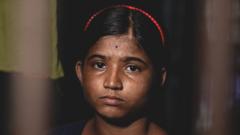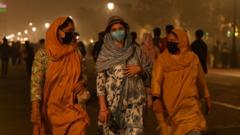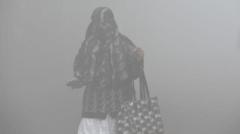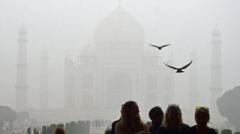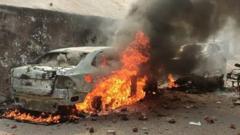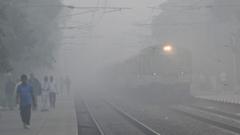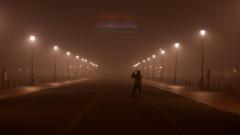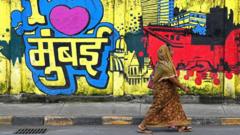**Delhi is grappling with extreme air pollution as the Air Quality Index (AQI) reaches unprecedented highs, prompting emergency actions from officials. Amid calls for accountability, the health impact on residents intensifies.**
**Delhi's Air Quality Crisis Escalates as Pollution Levels Hit 'Severe Plus'**
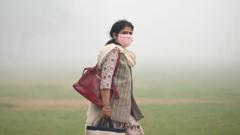
**Delhi's Air Quality Crisis Escalates as Pollution Levels Hit 'Severe Plus'**
**As the air quality in Delhi reaches alarming levels, authorities implement stringent measures to combat the crisis.**
Domestic air quality in India's capital, Delhi, has plummeted to critically dangerous levels, with recent measurements indicating an AQI of 1,500 as reported by IQAir, far surpassing the 300 AQI threshold deemed hazardous by the World Health Organization (WHO). This significant increase in air pollution has led to a thick haze enveloping the city, forcing transportation disruptions, including flight cancellations, and triggering the shutdown of educational institutions and construction projects.
Air pollution levels in Delhi have now reached a classification of "severe plus" by the country's pollution control authority, following readings above 450 earlier this week. This alarming situation mirrors recent pollution spikes in Lahore, Pakistan, which recently recorded AQI figures exceeding 1,000, prompting regional concerns.
With forecasts predicting worsening conditions in the coming days, environmental experts are emphasizing the necessity for stronger preventive measures. Amidst this growing crisis, the local government has implemented a range of emergency actions, including restricting non-essential truck access into the city and advising businesses to reduce their staff presence to 50%. Last week, Delhi officials further intensified regulations by banning coal and firewood usage and curtailing the operation of diesel generators outside of emergency contexts.
Every winter, Delhi, alongside other northern Indian states and parts of Pakistan, struggles with severe air quality degradation due to a combination of factors like declining temperatures, industrial emissions, vehicular pollution, and the burning of agricultural stubble. Despite the introduction of annual pollution control initiatives, the persistent issue continues to plague the city.
Delhi's Chief Minister, Atishi, has labeled the current pollution situation facing northern India a "medical emergency," attributing it to the unchecked stubble burning in neighboring states, such as Haryana, Uttar Pradesh, and Bihar. In political exchanges, she has criticized the ruling Bharatiya Janata Party (BJP) for its lack of effective action against this practice over recent years. Conversely, the BJP has redirected the blame towards Delhi's governing Aam Aadmi Party (AAP) for its inability to alleviate the capital's pollution levels.
In response to the crisis, residents have taken to social media to express their distress, highlighting the harmful impact of the toxic air on health. With complaints of persistent throat irritation and ineffective indoor air purifiers, community members are echoing a sentiment for civic activism, calling for a "peaceful mass protest" to combat this environmental emergency.
As Delhi grapples with its severe air quality crisis, the impact on public health remains a pressing concern for residents and officials alike, with ongoing debates about the responsibilities of local and national leadership in addressing the dire conditions.
Air pollution levels in Delhi have now reached a classification of "severe plus" by the country's pollution control authority, following readings above 450 earlier this week. This alarming situation mirrors recent pollution spikes in Lahore, Pakistan, which recently recorded AQI figures exceeding 1,000, prompting regional concerns.
With forecasts predicting worsening conditions in the coming days, environmental experts are emphasizing the necessity for stronger preventive measures. Amidst this growing crisis, the local government has implemented a range of emergency actions, including restricting non-essential truck access into the city and advising businesses to reduce their staff presence to 50%. Last week, Delhi officials further intensified regulations by banning coal and firewood usage and curtailing the operation of diesel generators outside of emergency contexts.
Every winter, Delhi, alongside other northern Indian states and parts of Pakistan, struggles with severe air quality degradation due to a combination of factors like declining temperatures, industrial emissions, vehicular pollution, and the burning of agricultural stubble. Despite the introduction of annual pollution control initiatives, the persistent issue continues to plague the city.
Delhi's Chief Minister, Atishi, has labeled the current pollution situation facing northern India a "medical emergency," attributing it to the unchecked stubble burning in neighboring states, such as Haryana, Uttar Pradesh, and Bihar. In political exchanges, she has criticized the ruling Bharatiya Janata Party (BJP) for its lack of effective action against this practice over recent years. Conversely, the BJP has redirected the blame towards Delhi's governing Aam Aadmi Party (AAP) for its inability to alleviate the capital's pollution levels.
In response to the crisis, residents have taken to social media to express their distress, highlighting the harmful impact of the toxic air on health. With complaints of persistent throat irritation and ineffective indoor air purifiers, community members are echoing a sentiment for civic activism, calling for a "peaceful mass protest" to combat this environmental emergency.
As Delhi grapples with its severe air quality crisis, the impact on public health remains a pressing concern for residents and officials alike, with ongoing debates about the responsibilities of local and national leadership in addressing the dire conditions.



